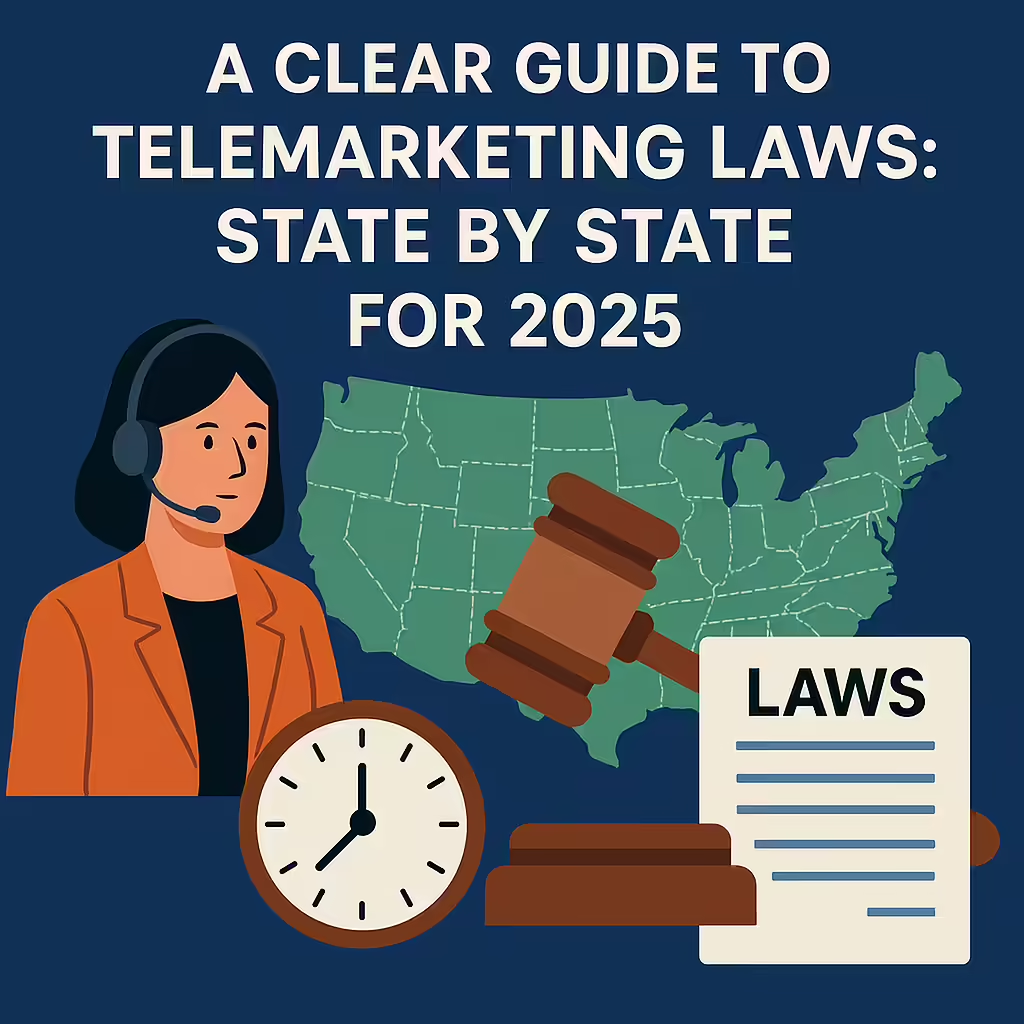The rules for telemarketing are complicated and change depending on the state. If you don't follow them, your business can face major financial and reputational damage. Fines under the federal Telephone Consumer Protection Act (TCPA) start at $500 for each mistake and can jump to $1,500 if the violation is willful. State laws are often even tougher. In Connecticut, for instance, a single violation can cost you up to $20,000.
This guide explains the rules in plain language. We'll cover federal and state calling hours, holiday restrictions, consent requirements, and new limits on how often you can call. The goal is to give you the information you need to run your sales campaigns confidently and legally.
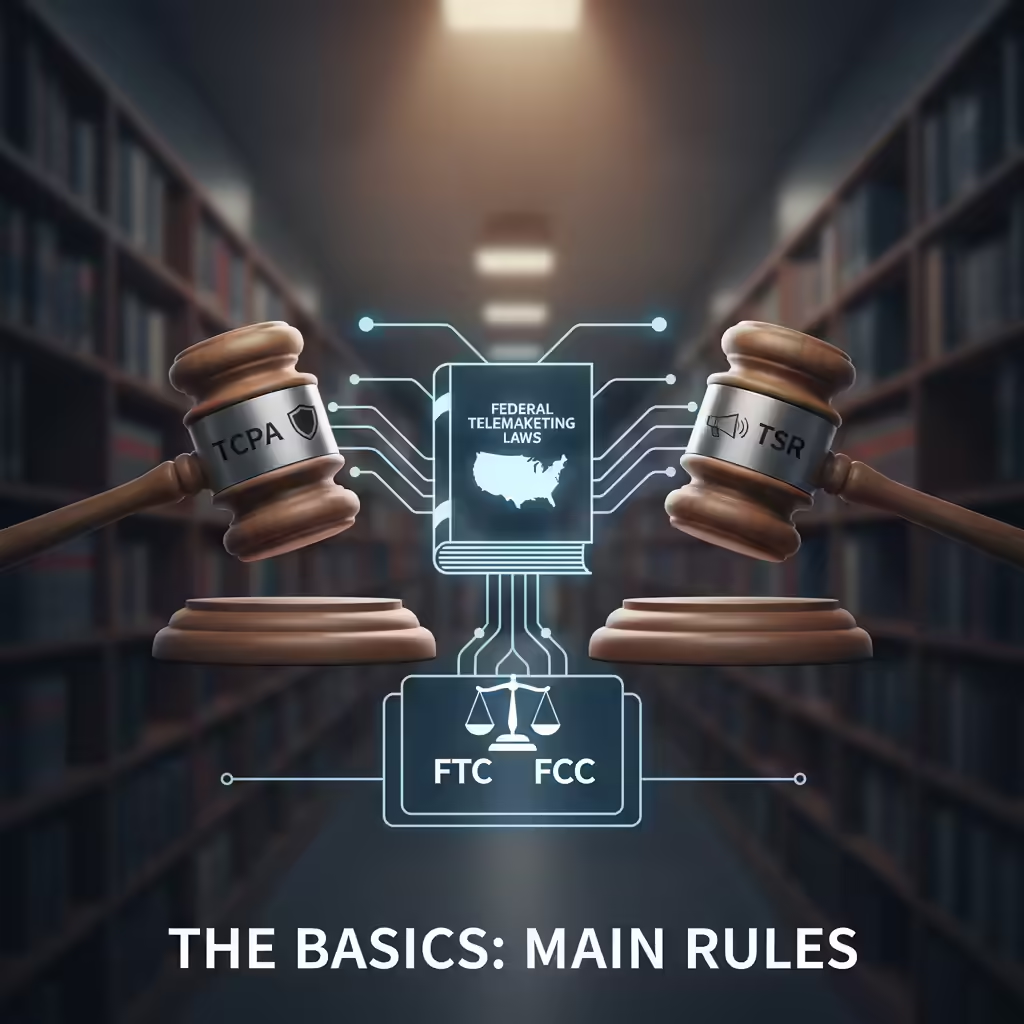
The Basics: Understanding the Main Telemarketing Laws
To build a solid compliance plan, you first need to understand the federal laws that all state laws are built on.
What's the difference between the TCPA and the TSR?
Two main federal laws control telemarketing in the U.S.: the Telephone Consumer Protection Act (TCPA) and the Telemarketing Sales Rule (TSR). They work together, but they focus on different things and are enforced by different agencies.
TCPA (FCC)
Enforced by the Federal Communications Commission (FCC). It mainly controls the technology you use to contact people. It restricts autodialers, artificial or prerecorded voice messages, and unwanted faxes.
TSR (FTC)
Enforced by the Federal Trade Commission (FTC). It focuses on what you say and do during a call. It's meant to stop deceptive and abusive sales tactics by requiring specific disclosures.
⚠️ Critical Difference
The biggest difference for your business is how they're enforced. The FTC enforces the TSR through government actions. The TCPA, however, gives individuals a "private right of action," meaning people can sue your company directly for violations. This rule is what fuels the thousands of class-action lawsuits against businesses.
Who enforces these telemarketing laws?
Compliance isn't just about the federal government. Your business has to answer to several groups at once.
- Federal Agencies: The FCC enforces the TCPA, and the FTC enforces the TSR.
- State Governments: Almost every state has its own telemarketing laws, enforced by the state's Attorney General. These laws are often stricter than federal rules.
- Private Citizens: Because the TCPA allows people to sue directly, individual consumers act as a primary enforcement group. Many state laws also give consumers the right to sue.
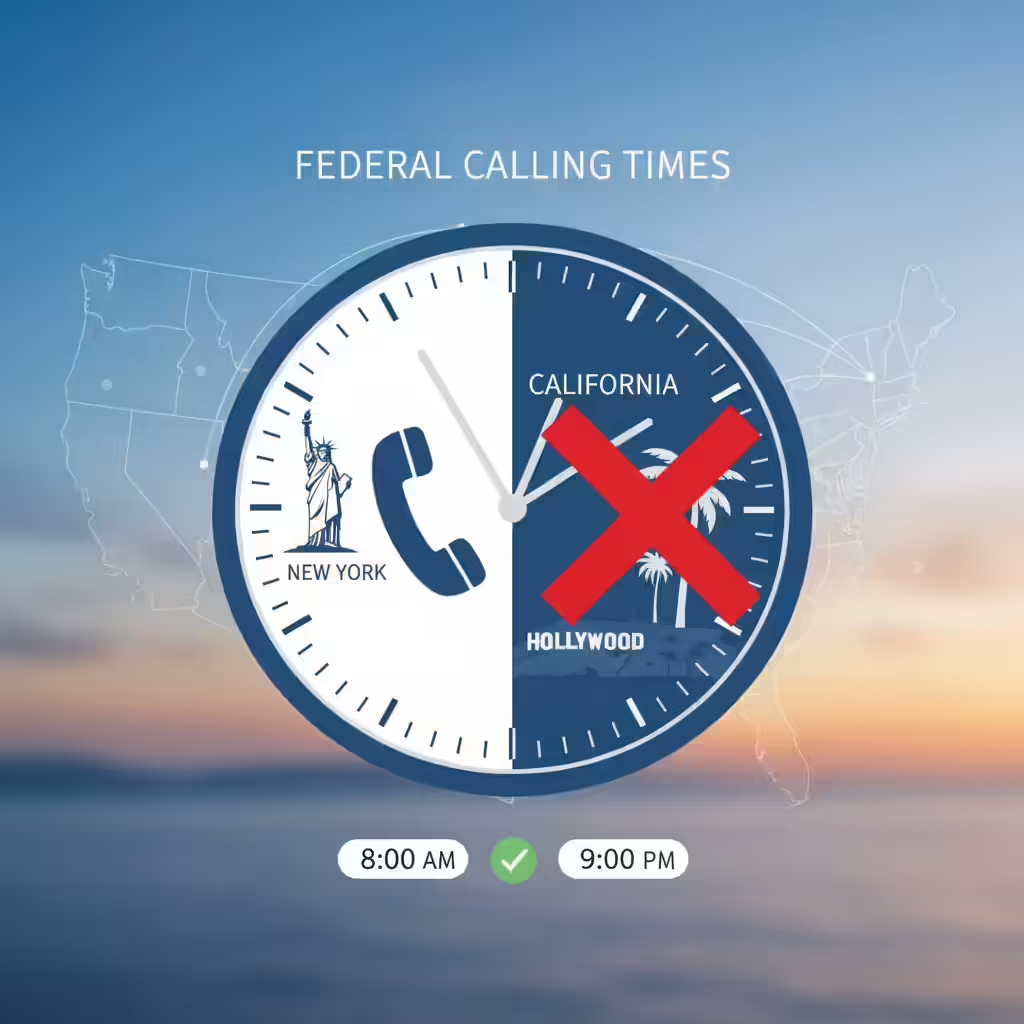
Federal Calling Times: The 8 a.m. to 9 p.m. Rule
The TCPA and TSR set a basic window for telemarketing calls: you can only call residential numbers between 8:00 a.m. and 9:00 p.m. A key detail is that this window applies to the recipient's local time zone, not yours. If your team in New York calls a prospect in California at 8:30 a.m. ET, you're making an illegal call at 5:30 a.m. PT.
💡 Remember
This federal rule is just a starting point. States often have shorter, more restrictive calling hours.
What is the National Do Not Call Registry?
The National DNC Registry is a database run by the FTC that lists people who don't want to receive most telemarketing calls. Signing up is free for people, and their number stays on the list permanently.
Your business must follow the registry. The law requires you to download the registry's data and remove those numbers from your call lists. This process, called "scrubbing," must be done at least every 31 days. If you don't, you can face federal fines up to $50,120 for each illegal call.
Are any calls exempt from the National DNC Registry?
Yes, the DNC rules don't apply to every call. The main exceptions are calls from:
- Political organizations.
- Charities asking for donations.
- Telephone surveyors.
- Companies with which the person has an "Established Business Relationship" (EBR).
- Companies that have the person's express written permission to call.
⚠️ Important
Even with an exemption, if someone asks you to put them on your company's own do-not-call list, you must do it immediately. That request overrides any other permission you have.
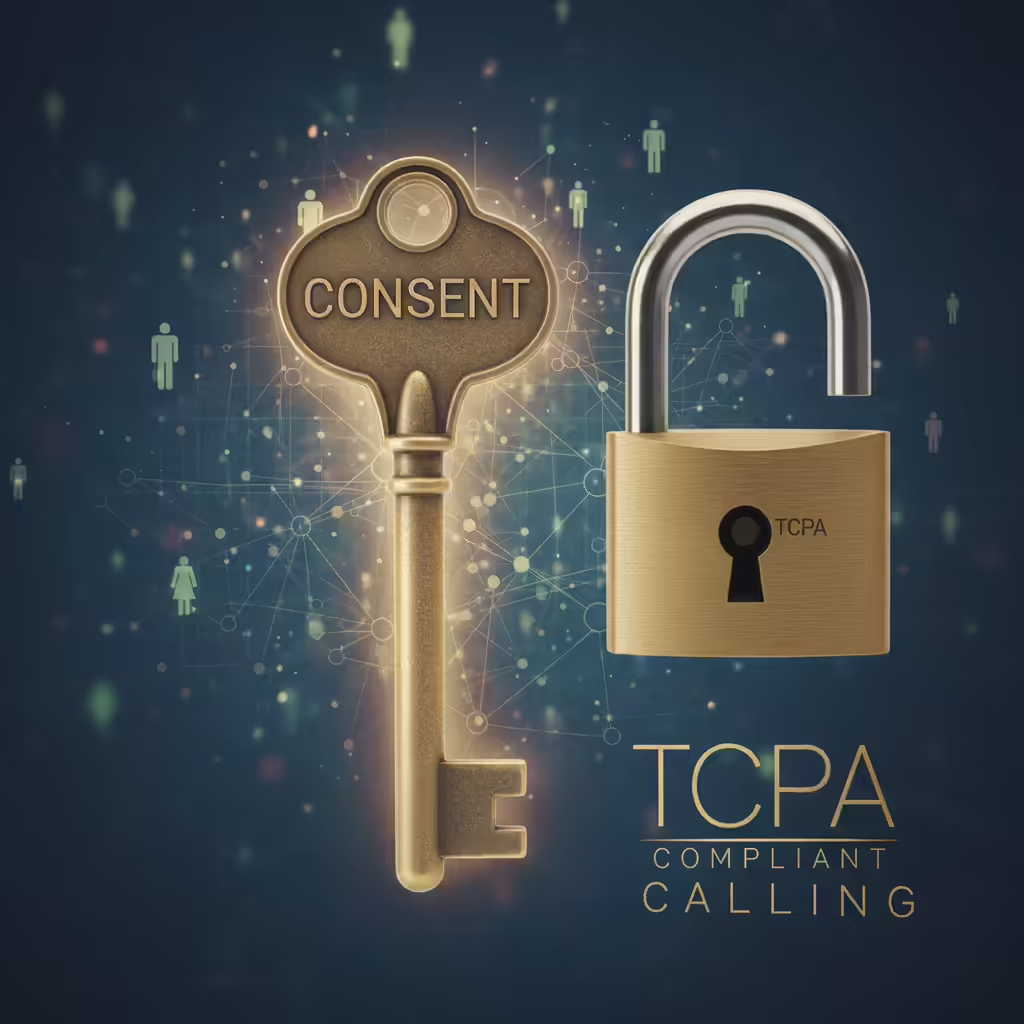
Consent: The Key to Compliant Calling
The TCPA requires different types of consent depending on how you call and why you're calling. Getting this wrong is a common and expensive mistake.
What are the different types of consent? (PEWC vs. PEC)
Prior Express Written Consent (PEWC)
This is the strictest type of consent. You absolutely need it for any automated or prerecorded marketing calls and texts sent to cell phones. You also need it for prerecorded marketing calls to landlines.
Prior Express Consent (PEC)
This is a lower level of consent that you need for automated or prerecorded informational messages, like appointment reminders. You can get PEC orally, and it can even be implied.
⚠️ Watch Out for Dual-Purpose Messages
Be careful with "dual-purpose" messages. A shipping notification that also includes a coupon is legally considered marketing. To send it, you need the higher PEWC standard, not just PEC.
How do I get valid "Prior Express Written Consent"?
To be legally valid, PEWC must meet several conditions. It is your job to prove you met them.
- Written Agreement: The consent must be in writing. Digital formats, like a checkbox on a website, count as a valid signature.
- Clear Disclosure: The disclosure must be clear, easy to see, and not hidden in fine print. It has to state that the person is agreeing to receive marketing messages from you using an automated system.
- Not a Condition of Purchase: You must clearly state that agreeing to receive calls is not required to buy anything.
- Identify Yourself: The disclosure must name the specific company that will be calling or texting.
- Affirmative Action: The person must take a clear action to agree, like checking a box themselves. Pre-checked boxes are not valid consent.
Does an "Established Business Relationship" (EBR) work as consent for automated marketing calls?
No. This is a very important point that many businesses get wrong. An EBR and PEWC are different legal ideas and you cannot swap them.
Understanding the Difference
- An EBR gives you an exemption from the DNC Registry rules for live, agent-dialed calls.
- PEWC is the consent you need under the TCPA to use an autodialer for marketing to a cell phone.
An EBR is not a substitute for the written consent the TCPA requires. Since most sales campaigns now use technology to call cell phones, the EBR exemption is often irrelevant. You still need to get PEWC.
How long does an Established Business Relationship last?
Under federal rules, an EBR's duration depends on the interaction:
- Transactional EBR: If they bought something, it lasts for 18 months from the last transaction date.
- Inquiry-Based EBR: If they just asked about a product, it lasts for 3 months from the date they inquired.
⚠️ State Variations
Some states have stricter rules. For example, California and Colorado shorten the inquiry-based EBR to only one month.
What happened to the FCC's "One-to-One Consent" rule?
The FCC created a rule to stop "lead generators" from collecting a single consent on a website and then selling it to hundreds of companies. The rule would have required "one-to-one consent," meaning a person's consent would only be valid for "one identified seller" for marketing that was logically related to the website they visited.
A federal court struck down this rule before it took effect in January 2025. While the rule is gone for now at the federal level, the legal attitude against sharing consent this way is still very strong. States may pass their own similar laws, or courts may decide that this practice doesn't meet the TCPA's existing "clear disclosure" standard.
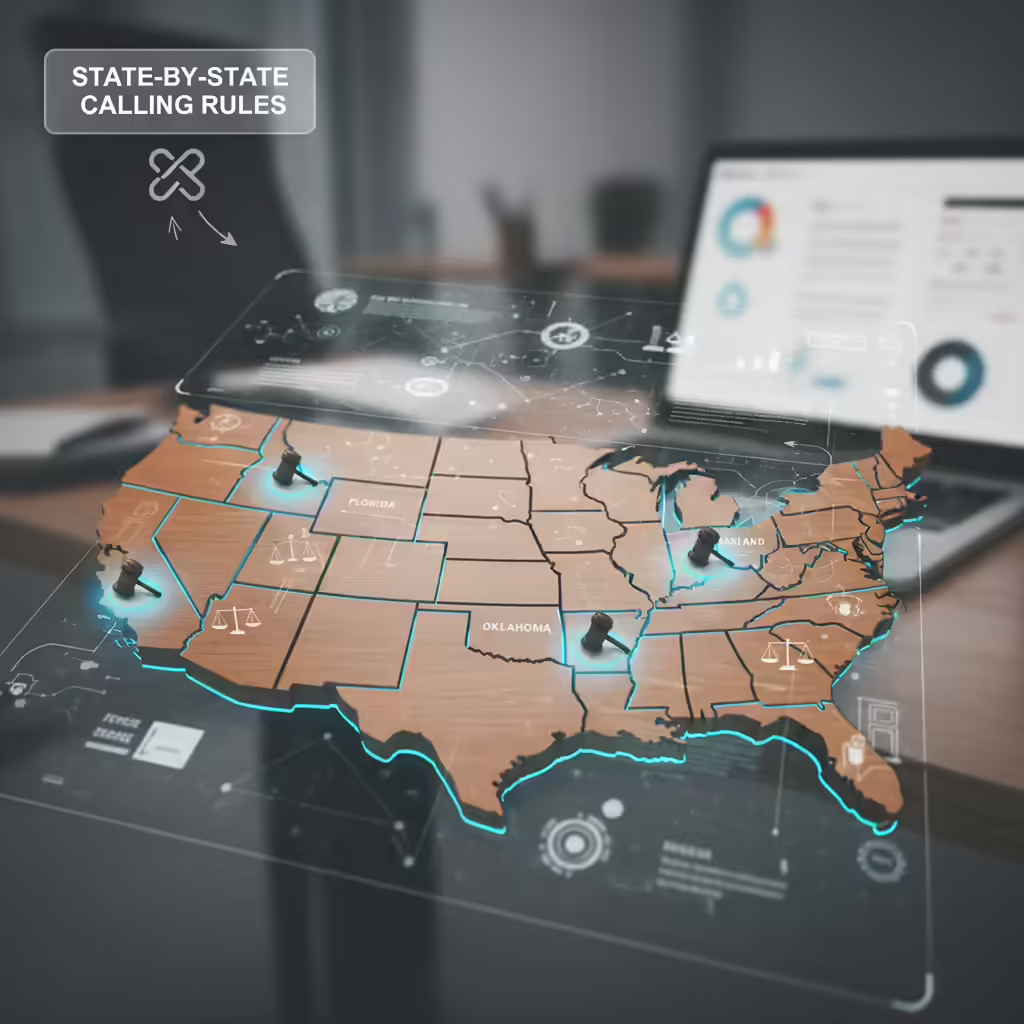
State-by-State Calling Rules
After a 2021 Supreme Court decision weakened parts of the federal TCPA, states like Florida, Oklahoma, and Maryland passed their own, stricter telemarketing laws. This means you have to pay close attention to the rules in every state you call.
Below is a quick-reference table for states with calling hours that are different from the federal 8 a.m. to 9 p.m. standard.
| State | Permitted Weekday Hours | Permitted Saturday Hours | Sunday Restrictions |
|---|---|---|---|
| Alabama | 8:00 a.m. - 8:00 p.m. | 8:00 a.m. - 8:00 p.m. | No Calls |
| Connecticut | 9:00 a.m. - 8:00 p.m. | 9:00 a.m. - 8:00 p.m. | 9:00 a.m. - 8:00 p.m. |
| Florida | 8:00 a.m. - 8:00 p.m. | 8:00 a.m. - 8:00 p.m. | 8:00 a.m. - 8:00 p.m. |
| Indiana | 9:00 a.m. - 8:00 p.m. | 9:00 a.m. - 8:00 p.m. | 9:00 a.m. - 8:00 p.m. |
| Kentucky | 10:00 a.m. - 9:00 p.m. | 10:00 a.m. - 9:00 p.m. | 10:00 a.m. - 9:00 p.m. |
| Louisiana | 8:00 a.m. - 8:00 p.m. | 8:00 a.m. - 8:00 p.m. | No Calls |
| Maryland | 8:00 a.m. - 8:00 p.m. | 8:00 a.m. - 8:00 p.m. | 8:00 a.m. - 8:00 p.m. |
| Massachusetts | 8:00 a.m. - 8:00 p.m. | 8:00 a.m. - 8:00 p.m. | 8:00 a.m. - 8:00 p.m. |
| Michigan | 9:00 a.m. - 9:00 p.m. | 9:00 a.m. - 9:00 p.m. | 9:00 a.m. - 9:00 p.m. |
| Mississippi | 8:00 a.m. - 8:00 p.m. | 8:00 a.m. - 8:00 p.m. | No Calls |
| Missouri | 8:00 a.m. - 9:00 p.m. | 8:00 a.m. - 9:00 p.m. | 8:00 a.m. - 9:00 p.m. |
| Nevada | 9:00 a.m. - 8:00 p.m. | 9:00 a.m. - 8:00 p.m. | 9:00 a.m. - 8:00 p.m. |
| Oklahoma | 8:00 a.m. - 8:00 p.m. | 8:00 a.m. - 8:00 p.m. | 8:00 a.m. - 8:00 p.m. |
| Pennsylvania | 8:00 a.m. - 9:00 p.m. | 8:00 a.m. - 9:00 p.m. | 8:00 a.m. - 9:00 p.m. |
| Rhode Island | 9:00 a.m. - 6:00 p.m. | 10:00 a.m. - 5:00 p.m. | No Calls |
| South Dakota | 9:00 a.m. - 9:00 p.m. | 9:00 a.m. - 9:00 p.m. | No Calls |
| Texas | 9:00 a.m. - 9:00 p.m. | 9:00 a.m. - 9:00 p.m. | 12:00 p.m. - 9:00 p.m. |
| Utah | 8:00 a.m. - 9:00 p.m. | 8:00 a.m. - 9:00 p.m. | No Calls |
| Washington | 8:00 a.m. - 8:00 p.m. | 8:00 a.m. - 8:00 p.m. | 8:00 a.m. - 8:00 p.m. |
| Wyoming | 8:00 a.m. - 8:00 p.m. | 8:00 a.m. - 8:00 p.m. | 8:00 a.m. - 8:00 p.m. |
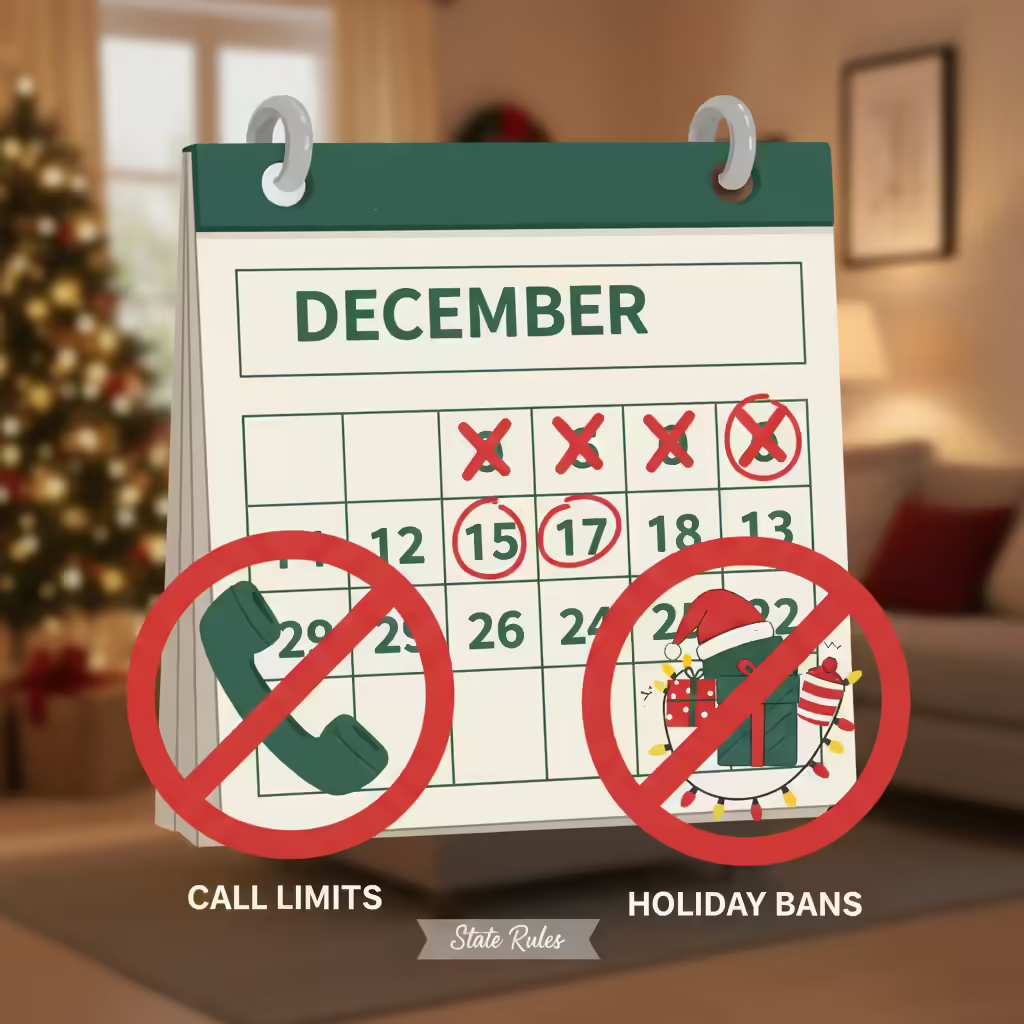
Holiday Bans and Call Limits
In addition to calling times, you need to watch out for state rules on holidays and call frequency.
Are there specific days I can't call?
Yes. Federal law doesn't ban holiday calls, but several states do. These states include Alabama, Louisiana, Mississippi, Pennsylvania, Rhode Island, and Utah.
⚠️ State-Specific Holidays
The challenge is that state holidays aren't always the same as federal ones. For example, you can't make sales calls in Alabama and Louisiana on Mardi Gras, or in Utah on Pioneer Day. Your business needs to keep a state-specific holiday calendar and block these dates in your dialing system.
Common holidays with calling bans in these states include New Year's Day, MLK Jr. Day, Memorial Day, Independence Day, Labor Day, Thanksgiving, and Christmas.
What are call frequency caps?
Some states now limit how often you can call someone. Florida, Maryland, and Oklahoma have nearly identical rules that ban more than three sales calls to the same person in a 24-hour period about the "same subject matter or issue."
💡 Safe Strategy
The phrase "same subject matter" is not defined, which creates a legal risk. A court would likely see any sales call from your company as the "same subject." The safest strategy is to treat this as a company-wide limit: no more than three calls total from your business to one person per day in these states.
Fines, Lawsuits, and Specific Cases
If you don't follow the rules, you can face large fines and other legal problems.
What are the fines for breaking the rules?
Fines are calculated per call or per text, so they can add up quickly.
| Jurisdiction | Law | Standard Fine (per violation) | Willful Violation Fine |
|---|---|---|---|
| Federal | TCPA | $500 | Up to $1,500 |
| Federal | National DNC (TSR) | Up to $50,120 | Up to $50,120 |
| Connecticut | CT State Law | Up to $20,000 | Up to $20,000 |
| Florida | FL State Law | $500 | Up to $1,500 |
| New York | NY State Law | Up to $20,000 | Up to $20,000 |
| Oklahoma | OK State Law | $500 | Up to $1,500 |
Can people sue my company directly?
Yes. The TCPA gives people a private right of action, which means they can sue your company directly without waiting for the government to act. Because the fines are per call, these lawsuits often become class actions involving thousands of people, leading to massive settlements. Many new state laws, like those in Florida and Oklahoma, also allow individuals to sue.
Are business-to-business (B2B) calls exempt from all rules?
No. It's a common mistake to think B2B calls are completely exempt. While the TSR has a general B2B exemption, the TCPA does not. The TCPA's rules about using autodialers and prerecorded messages to call cell phones apply just as much to business numbers as they do to personal numbers. Since many B2B contacts use cell phones for work, you still need to get Prior Express Written Consent (PEWC) for those automated calls.
Do the same rules apply to sending SMS/text messages?
Yes. The law considers a text message to be a "call." This means all the telemarketing rules—getting proper consent (PEWC for marketing), calling hours, and state restrictions—apply to commercial text messaging.

Practical Steps for Compliance
Knowing the rules is half the battle. Here's how to put them into practice to protect your business.
- Use Technology to Prevent Mistakes: Trying to track compliance manually is asking for trouble. Use a dialing platform that can automatically detect local time zones and block calls outside of legal hours or on state holidays.
- Automate Your DNC Scrubbing: Your dialing system should automatically scrub your call lists against the national, state, and your own internal DNC lists before every campaign.
- Keep Good Records to Protect Your Business: If you end up in court, it's your job to prove you followed the law. Good records are your legal defense. The most important thing is to keep verifiable proof of Prior Express Written Consent for at least five years.
- Train Your Team: Your salespeople are your first line of defense. Train them regularly on calling hours, consent rules, and what to do when someone asks to be put on your do-not-call list (which they must do immediately).
Conclusion: Good Compliance Is Good Business
Following today's telemarketing laws requires a detailed plan. But a strong compliance program is more than just a defensive move; it's part of a professional, customer-focused sales strategy. When you respect a prospect's time and privacy, you show professionalism and build the trust needed for a long-term business relationship. In a world where consumers are increasingly skeptical, communicating respectfully isn't just a legal requirement—it's a real advantage.
Official State Resources: Your Source of Truth
Telemarketing laws are dynamic and change frequently. While this guide provides a comprehensive summary, the ultimate source of truth is always the official text of the laws themselves. To help with your ongoing compliance, here are direct links to the primary government sources for many of the states discussed.
-
Alabama
- Resource: Alabama Telemarketing Act
- Resource: Public Service Commission Rules
- Connecticut
-
Florida
- Resource: Florida Telemarketing Act
-
Kentucky
- Resource: Kentucky Telemarketing Laws
- Louisiana
-
Maryland
- Resource: Maryland Telephone Solicitations Act
- Massachusetts
- Mississippi
- Missouri
-
Nevada
- Resource: Nevada Do Not Call Registry
- Oklahoma
- Pennsylvania
-
Rhode Island
- Resource: Telephone Sales Solicitation Act
-
South Dakota
- Resource: Telemarketing (SDCL 37-30A)
- Texas
-
Utah
- Resource: Telephone and Facsimile Solicitation Act
-
Washington
- Resource: Telephone Solicitation (RCW 80.36.390)
-
Wyoming
- Resource: Telephone Solicitation Act


